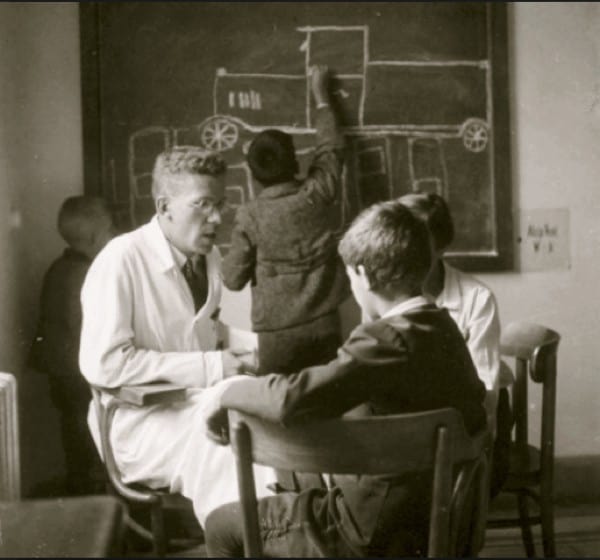In 1938, Hans Asperger, an Austrian pediatrician working at the University of Vienna Paediatric Clinic, became one of the first specialists to identify and label the symptoms of a specific form of autism amongst the children under his care. The children affected were often highly intelligent. However, they also found social interaction and communication difficult. Asperger labeled these children as “Autistic Psychopaths.” His findings became part of his doctoral thesis, and in 1944 he published them. Dr. Asperger’s contributions to the study of autism were finally recognized after his death in 1980 as ‘Asperger’s syndrome’ as it became increasingly known, began to receive widespread acceptance.
Asperger conducted much of his ground-breaking work under the shadow of the Nazis and their Eugenics program. Two years before ‘The Final Solution” was implemented, the Nazis murdered around 200,000 adults and children deemed ‘unworthy of life” because of their mental and physical disabilities. It was long believed that Asperger had put himself at risk, refusing to hand over his vulnerable patients to the Nazi authorities. However, new evidence gleaned from medical records, Nazi documents and Asperger’s personnel files suggests that Asperger was, in fact, complicit in the Eugenics program, sending disabled children from his clinic in Vienna to their deaths.

Hans Asperger and Asperger’s Syndrome
Johann “Hans” Asperger was born in Vienna on February 18, 1906. The eldest of three boys, Asperger was a lonely child who found it difficult to make friends and referred to himself in the third person. Social inadequacies aside, Asperger was a talented linguist and had a pedantic interest in the poetry of Franz Grillparzer. Interestingly, the young Asperger seems to have displayed many of the same characteristics on the autism spectrum that was eventually to bear his name. If he were a sufferer of Asperger’s himself, this would have given him a unique insight into the condition.
Asperger studied medicine at the University of Vienna under Dr. Franz Hamburger, graduating with his medical degree in 1931. That same year, he joined Vienna University’s Children’s Clinic. In 1932, he moved to the Therapeutic Pedagogy Ward as an ‘auxiliary’ physician. The ward had been founded in 1911 by Erwin Lazar to treat what was termed “mental imbalance” in children. Today, these children would be deemed to have behavior problems. In early twentieth century Vienna, they were problem children, referred to the clinic by the authorities. Most were treated as outpatients, but severe or interesting cases were admitted.
By 1935, Asperger was an assistant physician and in charge of the ward. At some point, he began to study the behavior of certain children who passed into his care. Four boys, in particular, were singled out as specific case studies however it is believed that over four hundred children were involved. All exhibited certain shared behaviors and abilities. Asperger’s child case studies found making friends hard, displayed little empathy, were often physically clumsy and yet able to become super absorbed with activities that interested them.

Asperger grouped these behaviors under the title “Autistic psychopathy” from the ancient Greek for self-autos and psychopathy meaning personality disease. However, he also recognized that his young patients were extremely talented. Asperger became convinced that with the right help his “Little Professors” could become highly productive adult members of society. Asperger presented his findings for the first time at a workshop in 1938. They also formed the basis of his doctoral thesis and finally in 1944 he published his results. Asperger went on to have a respected career in child psychology. However, it was not until his death on October 21, 1980, that his work in autism was recognized.
Towards the end of World War II, Asperger had opened a school for children with a Sister Viktorine Zak. However, the school was bombed and destroyed- and much of Asperger’s work with it. However, in 1981, the term ‘Asperger’s syndrome” finally became an accepted medical term. For a British psychiatrist, Lorna Wing had rediscovered Asperger’s thesis and spread the word about his work. Asperger went from being ignored in the English speaking world to being regarded as a pioneering hero. Stories began to spread of how he helped and protected his young patients during the Nazi era at significant personal risk.

